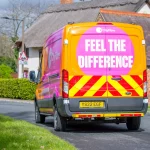Gov Consults on UK’s Future Wireless Spectrum and 6G Needs

A new ‘Call for Evidence‘ is being launched by the Government today, which aims to inform their future Wireless Infrastructure Strategy (WIS). This attempts to understand the future wireless connectivity needs of the UK and how they can better support 5G mobile, as well as future satellite, IoT and 6G broadband technologies.
The consultation predictably states that, over the next decade, wireless networks will need to cope with far larger quantities of data consumption and connect billions of devices, supporting critical applications across the entire economy. This would of course be true no matter what year – past, present or future – the consultation was conducted (demands are always rising).
As usual the Government’s press release quickly wonders into the territory of excessive hype when talking about 6G, while neatly ignoring that identical claims were made about 5G: “6G will power things like virtual reality calls, which give the sensation of being in the same room as the person at the other end of the line, revolutionise wearable technologies to improve healthcare and could allow for greater advances in smart cities and manufacturing.”
Advertisement
The consultation should help the government to set out what role they’ll play in supporting related investment, while also building a new policy framework to encourage innovation, competition and investment in both existing and future networks. It will also examine what regulatory changes might be needed via Ofcom, such as in terms of future spectrum allocations and auctions etc.
The call for evidence seeks responses from a wide range of interested parties, including fixed and mobile network operators and service providers, academics, the public, consumer interest groups and businesses and their trade associations. The government intends to publish the WIS at some point in 2022.
Nadine Dorries MP, UK Digital Secretary, said:
“The Government is on a mission to connect the country to next-generation networks. Today’s announcements will help harness the huge potential of 5G and future wireless networks such as 6G to supercharge our plan to build back better.”
At this point it’s important to remember that 6G development is not something that the UK Government has much control over and is more the product of various research teams from different countries, which will all eventually feed into an agreed standard. Overall, 6G isn’t expected to become a solid standard until around 2025, with commercial builds following in 2028, but the first draft standard may be defined in the 2021/22 period.
The big challenge for 6G is in knowing where to go with the technology. On that front we find ourselves agreeing with a recent call from Ofcom, various MPs and the Institution of Engineering and Technology (IET), which suggested moving away from the usual focus on “ever higher data [speeds] and ever higher spectrum bands” (here).
Advertisement
After all, if operators are already struggling to make a viable commercial model from the mmWave bands (these aren’t yet being used for 5G mobile in the UK), then pushing 6G into the TeraHertz bands would be the exact opposite of a fix for those challenges. On the other hand you never know what tomorrow will bring and 6G improvements will be about more than just higher frequency spectrum.
Mark is a professional technology writer, IT consultant and computer engineer from Dorset (England), he also founded ISPreview in 1999 and enjoys analysing the latest telecoms and broadband developments. Find me on X (Twitter), Mastodon, Facebook, BlueSky, Threads.net and Linkedin.
« Public Funding Links 1,084 UK Schools to Full Fibre Broadband






















































Make all masts host neutral, so they support all users on all networks. And make it certain it covers every single building and road across the country, and where possible as much of the land too.
Can’t see it happening, but…
Would be so much easier if all networks agreed to share infrastructure, but then that would take any competition away. All the networks would have the same quality/coverage.
Still be competition because the various operators all offer various items to differ themselves from each other eg Vodafone has 5G roaming aboard, EE has Apple Music, O2 has O2 Rewards/Priority and Three has their easyJet partnership, even if all mobile phone masts were made neutral and hosted all 4 operators because each operator has different offers to its customers I believe that is competition even if coverage is same.
The other view to consider is if what might save costs is if a single company took over all mobile phone masts and was responsible for the maintaining of said masts who then allowed the mobile operators to use their infrastructure for a fee which would then allow the mobile operators to concentrate on providing a service while the infrastructure is looked after by a single company.
@Adam .. “All the networks would have the same quality/coverage.”.
Yep, so they would have to compete on things like price, features, customer service etc etc.
I mean all the UK ISPs don’t run their own fibre optics do they? Most rely on Openreach.
Relying on a single company running the masts would be a total disaster, look at the mess the government and Open Reach have made of upgrading to FTTH.
I’d rather have the companies owning their own networks as it’s less complicated for future upgrades then and far less political.
Even more targets for nutters to set fire to
I agree anti 5g nutjobs like mark steele spout is bs on to gullible followers of his
The operators refuse to spend the money installing adequate 4G/5G let alone anything else.
4G is a disaster in many areas, woefully under under engineered and under spec’d.
On O2 network, come 4pm Mon-Fri, I cannot send iMessages they all drop to SMS, like clockwork. This network is utterly incompetent and they claim to have “no problems” which the deliberate incompetence enrages me even further.
Hearing about 6G is a joke right now when we are all still waiting for 4G to work properly and for coverage to be seen above 1-2 bars nationally.
Same in our local town center, patchy and unreliable, due no doubt to the less than ideal mast positions. I’m lucky at home to get a reasonable 4G broadband connection from an EE mast, Not sure how long that will last as the commercial forestry between us and it grows taller and denser.
5G upgrades to existing masts aren’t going to improve the coverage, I feel most users locally would prefer better 4G availability and operator choice than patchy areas with speeds they don’t even need.
I’m sure UK will find a way to make 6G work at 4mbits.
Before jumping ahead,they need sort out 4G,my local mast got shut down by land owner.(rent problem)
Nearest mast is 6 miles away! From previous one,cannot get even 2G outside.
A temporary mast was refused due it’s appearance by local council.
I know I live in the sticks
The problem isn’t confined just to the sticks, it’s all over social media, campaigns to stop phone masts, and a lot are successful in stopping them, the digital divide will continue, but it’s what they want.